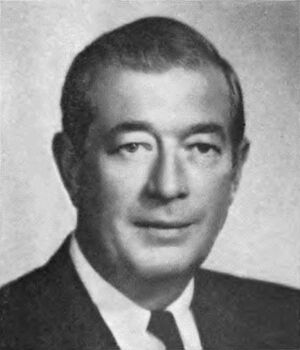Difference between revisions of "Thomas Downing"
(unstub) |
m (Robin moved page Thomas N. Downing to Thomas Downing over redirect: Shorter, simpler) |
(No difference)
| |
Latest revision as of 16:47, 18 June 2021
(lawyer, politician, judge) | ||||||||
|---|---|---|---|---|---|---|---|---|
 | ||||||||
| Born | 1919-02-01 Newport News, Virginia | |||||||
| Died | 2001-10-23 (Age 82) Newport News, Virginia | |||||||
| Alma mater | Virginia Military Institute, University of Virginia | |||||||
| Member of | HSCA | |||||||
| Party | Democratic | |||||||
Chairman of the House Select Committee on Assassinations
| ||||||||
Thomas Nelms Downing was a lawyer, politician, and Democratic Congressman from Virginia for nine terms. Downing was one of the first to question the credibility of the Warren Commission and began a campaign for a new investigation into the assassination of John F. Kennedy.
Downing said he was certain that Kennedy had been killed as a result of a conspiracy. He believed that the deaths of Sam Giancana and Johnny Roselli were highly significant. He also believed that the Central Intelligence Agency and the Federal Bureau of Investigation had withheld important information from the investigation.
Contents
Biography
Downing was born and raised in Newport News, Virginia. He attended Newport News High School, and graduated from Virginia Military Institute in 1940. After serving in the United States Army from 1942 to 1946, he attended and graduated from the University of Virginia Law School in 1948. He practiced as a lawyer, as well as a substitute judge of the municipal court of Warwick, Virginia.
Congress
In 1958 he was elected as a Democrat to Congress and was re-elected eight times, before declining to run in 1976. Downing served 18 years in Congress prior to retiring in 1977.[1]
House Select Committee on Assassinations
Downing was appointed Chairman of the House Select Committee on Assassinations by Carl Albert, the Speaker of the United States House of Representatives.[1] The Committee was tasked to look into evidence that was not available to the Warren Commission during its investigation of the assassination of John F. Kennedy.[1] Upon his retirement from Congress in 1977, Louis Stokes succeeded Downing as Chairman.[1]
Downing stated before[2] and after[1] the HSCA's investigation that he believed there was a conspiracy to assassinate Kennedy. He pushed for a House committee to investigate the assassination nearly two years before its formation.[3] In August 1976, he released affidavits from two men who stated that Richard Nixon approved the plan of a right-wing Cuban exile to "eliminate" left-wing Cuban exiles after the Bay of Pigs invasion.[3] Downing said that their statements raised the possibility that right-wing Cubans killed Kennedy.[3]
Downing said that he was skeptical that Lee Harvey Oswald could accurately fire a bolt-action rifle within a short span of time, and he believed video footage of the assassination showed that Kennedy was struck from the front and the rear.[1] According to a theory provided by Downing, one which he said was without evidence and based on speculation, anti-Castro Cuban exiles killed Kennedy due to his failure to support them after the 1961 Bay of Pigs invasion.[1] Downing stated that they expected pro-Castro Cubans would be blamed for the assassination in retaliation for the attempted assassination of Fidel Castro by United States agents.[1] Downing said: "I am firmly convinced, I am sincerely convinced, that more than one person was shooting at President Kennedy in Dallas that day. It is so obvious to me."[1]
Downing described JFK, Oliver Stone's 1991 film as "not a documentary, it's entertainment,"[1] In the same interwove, Downing did not change "his sincere conviction" that more than one shooter was involved. "It's so obvious to me." [1]
Prior to the investigation, James J. Kilpatrick described Downing as "a man of exception integrity and common sense" yet "not altogether unbiased in the matter of Kennedy's assassination".[2] Robert P. Gemberling, head of the FBI's investigation of the assassination for thirteen years after the release of the Warren Commission's report, said in 1976 that Downing and his successor, Henry B. Gonzalez, had "preconceived conspiracy theories".[4]
Later life and death
He died from the complications of intestinal surgery at the age of 82, and is interred in Peninsula Memorial Park Cemetery, Newport News, Virginia.
References
- ↑ a b c d e f g h i j k https://news.google.com/newspapers?id=7OVLAAAAIBAJ&pg=2743%2C1351861
- ↑ a b https://news.google.com/newspapers?id=-qhGAAAAIBAJ&pg=4288%2C2024979%7Caccessdate=May 15, 2013|newspaper=The Day|date=October 12, 1976
- ↑ a b c https://news.google.com/newspapers?id=-N9NAAAAIBAJ&pg=6091%2C3848023
- ↑ https://news.google.com/newspapers?id=JkFBAAAAIBAJ&pg=6562%2C4607514